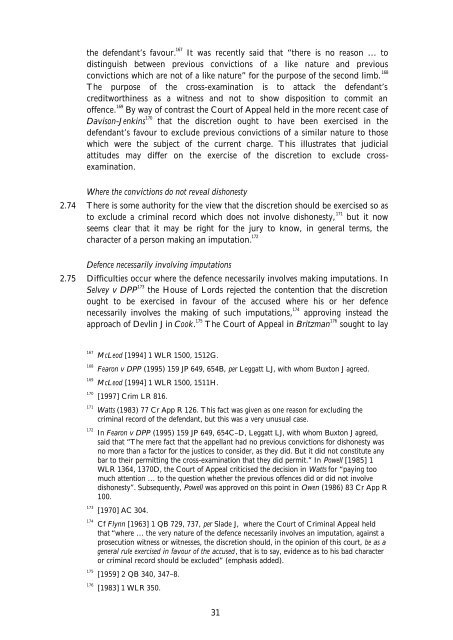Evidence of Bad Character in Criminal ... - Law Commission
Evidence of Bad Character in Criminal ... - Law Commission
Evidence of Bad Character in Criminal ... - Law Commission
You also want an ePaper? Increase the reach of your titles
YUMPU automatically turns print PDFs into web optimized ePapers that Google loves.
the defendant’s favour. 167 It was recently said that “there is no reason … to<br />
dist<strong>in</strong>guish between previous convictions <strong>of</strong> a like nature and previous<br />
convictions which are not <strong>of</strong> a like nature” for the purpose <strong>of</strong> the second limb. 168<br />
The purpose <strong>of</strong> the cross-exam<strong>in</strong>ation is to attack the defendant’s<br />
creditworth<strong>in</strong>ess as a witness and not to show disposition to commit an<br />
<strong>of</strong>fence. 169 By way <strong>of</strong> contrast the Court <strong>of</strong> Appeal held <strong>in</strong> the more recent case <strong>of</strong><br />
Davison-Jenk<strong>in</strong>s 170 that the discretion ought to have been exercised <strong>in</strong> the<br />
defendant’s favour to exclude previous convictions <strong>of</strong> a similar nature to those<br />
which were the subject <strong>of</strong> the current charge. This illustrates that judicial<br />
attitudes may differ on the exercise <strong>of</strong> the discretion to exclude crossexam<strong>in</strong>ation.<br />
Where the convictions do not reveal dishonesty<br />
2.74 There is some authority for the view that the discretion should be exercised so as<br />
to exclude a crim<strong>in</strong>al record which does not <strong>in</strong>volve dishonesty, 171 but it now<br />
seems clear that it may be right for the jury to know, <strong>in</strong> general terms, the<br />
character <strong>of</strong> a person mak<strong>in</strong>g an imputation. 172<br />
Defence necessarily <strong>in</strong>volv<strong>in</strong>g imputations<br />
2.75 Difficulties occur where the defence necessarily <strong>in</strong>volves mak<strong>in</strong>g imputations. In<br />
Selvey v DPP 173 the House <strong>of</strong> Lords rejected the contention that the discretion<br />
ought to be exercised <strong>in</strong> favour <strong>of</strong> the accused where his or her defence<br />
necessarily <strong>in</strong>volves the mak<strong>in</strong>g <strong>of</strong> such imputations, 174 approv<strong>in</strong>g <strong>in</strong>stead the<br />
approach <strong>of</strong> Devl<strong>in</strong> J <strong>in</strong> Cook. 175 The Court <strong>of</strong> Appeal <strong>in</strong> Britzman 176 sought to lay<br />
167 McLeod [1994] 1 WLR 1500, 1512G.<br />
168 Fearon v DPP (1995) 159 JP 649, 654B, per Leggatt LJ, with whom Buxton J agreed.<br />
169 McLeod [1994] 1 WLR 1500, 1511H.<br />
170 [1997] Crim LR 816.<br />
171 Watts (1983) 77 Cr App R 126. This fact was given as one reason for exclud<strong>in</strong>g the<br />
crim<strong>in</strong>al record <strong>of</strong> the defendant, but this was a very unusual case.<br />
172 In Fearon v DPP (1995) 159 JP 649, 654C–D, Leggatt LJ, with whom Buxton J agreed,<br />
said that “The mere fact that the appellant had no previous convictions for dishonesty was<br />
no more than a factor for the justices to consider, as they did. But it did not constitute any<br />
bar to their permitt<strong>in</strong>g the cross-exam<strong>in</strong>ation that they did permit.” In Powell [1985] 1<br />
WLR 1364, 1370D, the Court <strong>of</strong> Appeal criticised the decision <strong>in</strong> Watts for “pay<strong>in</strong>g too<br />
much attention … to the question whether the previous <strong>of</strong>fences did or did not <strong>in</strong>volve<br />
dishonesty”. Subsequently, Powell was approved on this po<strong>in</strong>t <strong>in</strong> Owen (1986) 83 Cr App R<br />
100.<br />
173 [1970] AC 304.<br />
174 Cf Flynn [1963] 1 QB 729, 737, per Slade J, where the Court <strong>of</strong> Crim<strong>in</strong>al Appeal held<br />
that “where … the very nature <strong>of</strong> the defence necessarily <strong>in</strong>volves an imputation, aga<strong>in</strong>st a<br />
prosecution witness or witnesses, the discretion should, <strong>in</strong> the op<strong>in</strong>ion <strong>of</strong> this court, be as a<br />
general rule exercised <strong>in</strong> favour <strong>of</strong> the accused, that is to say, evidence as to his bad character<br />
or crim<strong>in</strong>al record should be excluded” (emphasis added).<br />
175 [1959] 2 QB 340, 347–8.<br />
176 [1983] 1 WLR 350.<br />
31

















